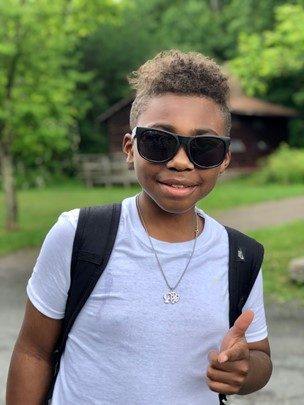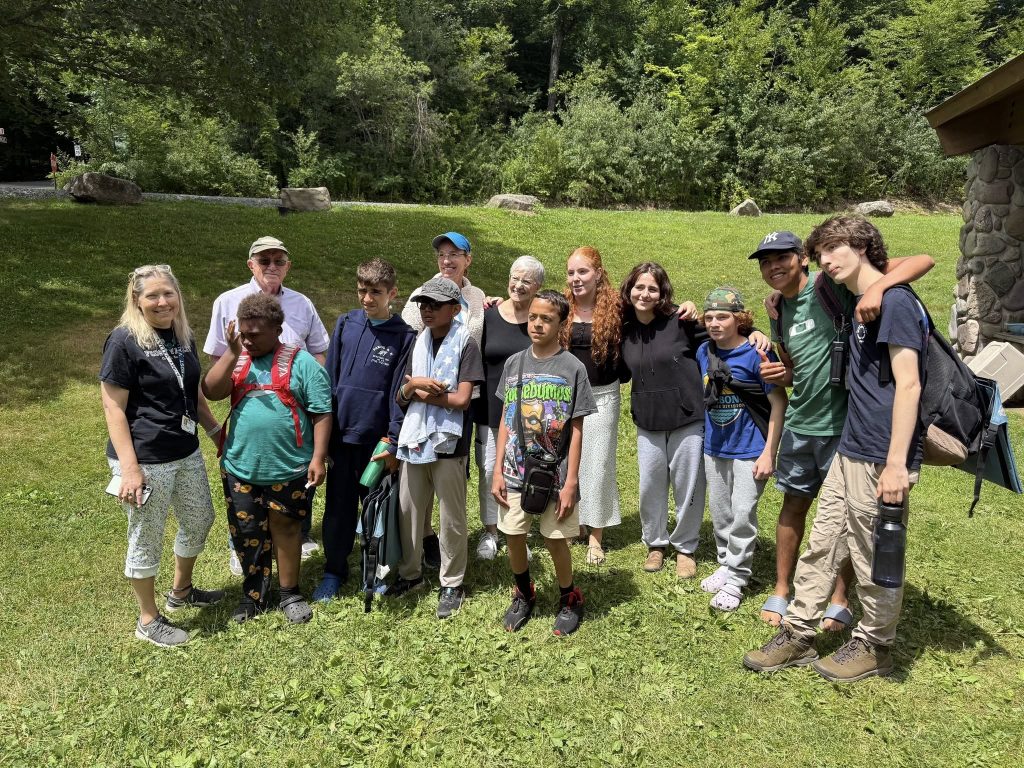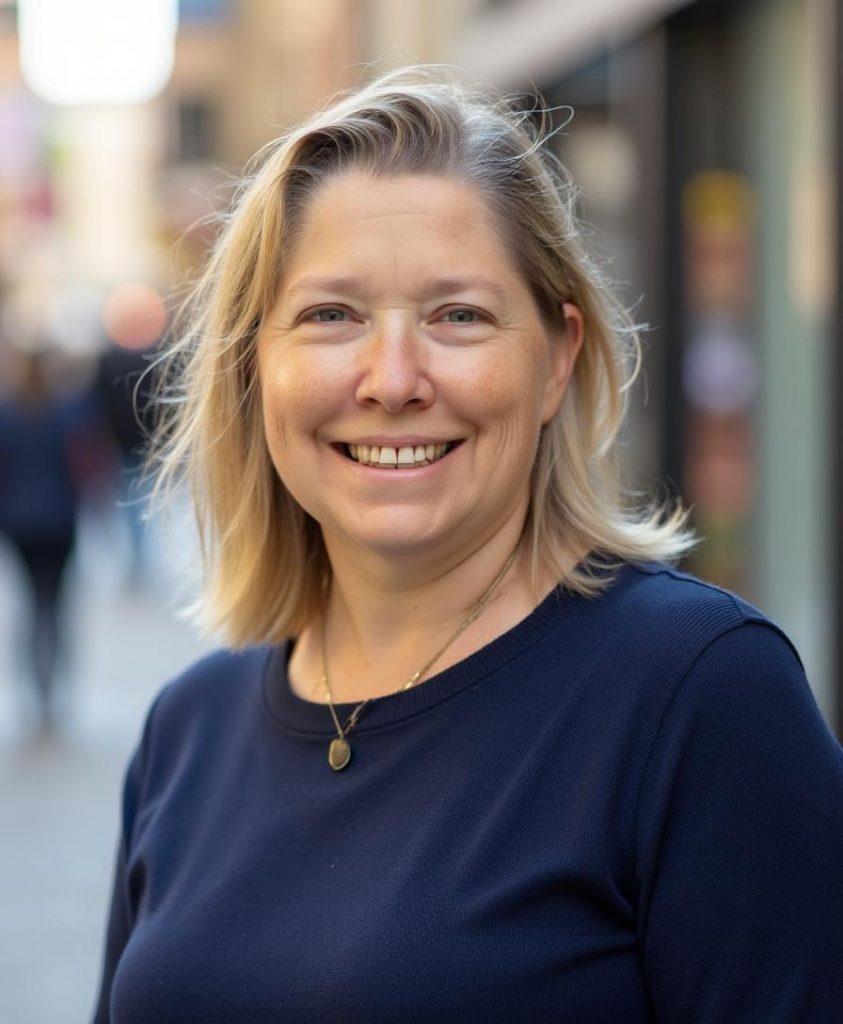By Maya Doyle, MSW, PhD
Back in 2005, I wrote an article for aakpRENALIFE called “Why Camp Counts”. At that point, I had been the pediatric nephrology social worker at the Children’s Hospital at Montefiore for a few years and had taken on the role of social work coordinator for our “kidney camp” program. This program that served children with special healthcare needs was different than any I had previously encountered, but I had only begun to grasp its history and value.
In that 2005 article, we reflected on the program’s 29th year. In 1975, Frost Valley YMCA, in partnership with The Ruth Gottscho Kidney Foundation (RGKF) and Montefiore/Einstein (now the Children’s Hospital at Montefiore), had established a ground-breaking mainstream camp experience for children “whose kidney disease had heretofore kept them tethered to clinics and hospitals and apart from the beauty, friends, and fun that other kids found at summer camp.” (Galusha, 2001) Over the years, we simplified that statement to reflect RGKF’s goal to allow our campers to be “free to be a kid”.
Fast forward to Fall of 2024, when we celebrated “50 years and counting” with a gathering of kidney campers, families, alumni, and staff who have joined our interprofessional team over the years – including more than 100 pediatric nephrology doctors, nurses, and other providers. We drew from archived photos and documents to create a retrospective of 50 years of this model program and acquired written and oral narratives from current and former campers, families, and staff, and the Montefiore network created a documentary video. This year, we are thrilled to share our history and our current experience creating a camp experience for kids with kidney disease.



Our history
As a child, Ruth Gottscho always wanted to attend summer camp, but she never had the chance. Ruth, born in 1945, was diagnosed with kidney disease at a very young age, before life-saving dialysis treatments were available. Every summer, when her childhood friends gleefully boarded buses for camp, Ruth stayed behind, wishing there was a way she could join them. Her loving parents, Eva and Ira — who met at a summer camp — sought to find a cure for their daughter over the years. Some treatments worked, others were less effective, but they continued searching for the best way to ease their daughter’s illness. In 1960, however, Ruth passed away at the age of 15 (Eichinger, 2018). In her memory, Eva and Ira founded the Ruth Gottscho Kidney Foundation (RGKF) as a way to help kidney patients find and afford treatments. After health insurance policies were enacted to make dialysis more accessible for people with kidney disease, the foundation’s focus switched to helping children with kidney disorders attend summer camp, making Ruth’s dreams come true for other children. Because of Eva’s persistence and the expertise of nephrologists like Ira Greifer and Bill Primack, Frost Valley YMCA’s leadership saw the potential and the necessity for “kidney camp”. In 1975, with only a few months of planning, Frost Valley’s dialysis center opened, with the help of the foundation, equipment donations from dialysis machine manufacturers, and caring staff recruited by Montefiore/Einstein. When the program began, we only served dialysis campers who faced not just kidney failure, but renal bone disease, anemia, growth delay, nutrition gaps, and ambulation challenges.
One of our alumnus nurse-coordinators shared this story at our anniversary celebration:
My favorite story is of a boy from Colombia who was relocated to live with his aunt in NYC, where dialysis would be available for him. He was confused and depressed and his response was to refuse to eat; a g-tube had been placed in his home unit. His aunt had been assured his medical needs would be met at camp, but nobody mentioned the g-tube, so no enteral feedings or supplies were sent. We began ordering supplies and sent him off to meet his cabinmates and village. That’s when ‘Frost Valley magic’ kicked in - meals in the dining hall with cabinmates proved irresistible! We never used the feedings that arrived; and our camper went home at the end of session to have his g-tube removed. I can see him sitting cross-legged on the bed in the hemo unit with a huge smile and a paper plate holding a bagel balanced on top of his head. Since our program’s founding, tremendous medical advances have occurred, and many children who would have been dialysis campers now come to camp after a successful kidney transplant. Other children with chronic conditions now have treatment options that may slow progression to kidney failure, though their care remains complex. Camp programs for children with many types of healthcare needs and disabilities have proliferated across the country and across the world, and some programs are “direct descendants” of ours. Then as now, summer camp programs for children with kidney disease may be “mainstream”
or “disease/condition-specific” (Klee et al., 1997). The programs have many different structures – while the program at Frost Valley focuses on integrating “kidney campers” with “typical” campers throughout the summer, other programs are more “disease-specific”, bringing together a group of children who share a similar health experience, while yet others bring both child, parents, and siblings to camp together. No matter which program you choose (or which program is close to you), the camp experience is a vital one for a child with kidney disease – and their family – whether living with dialysis, a transplant, or a chronic kidney condition.
How it works now
Throughout the year, an interprofessional team collaborates to plan and improve the camp experience, including needs of campers, staffing, dialysis supplies, medications, camp staff education about kidney disease, and more. Through camperships from RGKF, each child has a traditional summer sleepaway camp experience for 12 days, in villages with same-age peers, while gaining confidence and independence. Campers meet other children with kidney disease, as well as non-affected peers and counselors, while learning new skills and improving management and coping with their kidney condition. Dialysis treatment and medication times are arranged to allow for maximum participation in camp activities –archery, boating, hiking, crafts, and all kinds of games. Proudly, camp at Frost Valley remains a screen-free environment, further helping kids connect with each other. Attention is given to the individual medical, social, and developmental needs of each child. When needed, we can partner with Project MAC, a program of the YAI (Young Adult Institute) agency that runs simultaneously at Frost Valley, which provides additional support for campers with intellectual/developmental disabilities.
Across the summers when the country was coping with COVID, we were of course cautious of bringing our kidney kids to camp. We created alternative options like Zoom drop-ins and scholarship-funded kidney weekends, where families could attend together in their “pods” and interact with each other in outdoor activities and while masking. While it didn’t replace the full experience of summer camp, it provided bonding opportunities for kids and families who were more isolated than ever.
The value of camp
While some of the values of camp seemed obvious from the beginning, our years of observation and interaction with campers and families, data collected, and news from our alumni have confirmed and expanded this list.
Independence/autonomy
All parents worry about their children, and for parents whose child has CKD or ESRD, that worry can be overwhelming. Dependence on a dialysis machine, a medication regimen, and close supervision by medical staff is contradictory to a child’s normal pattern of increasing independence as they grow and enter adolescence and young adulthood (Primack & Greifer, 1977). Camp helps these kids
get beyond the familiar, their home and their medical setting, while in a safe and medically supervised environment. Our program at Frost Valley has both parents and kids take a big leap of faith – two weeks away from home for the “kidney campers”, two weeks at home for parents without “kidney kids”. At our Frost Valley program, we don’t heavily promote educating campers about their healthcare regimen or symptoms but build teaching into all of our interactions. Parents report better adherence, more self-management, and even more willingness to do chores at home.
Self Confidence
For healthy children as well as “kidney campers”, the summer camp experience provides opportunities to try all sorts of sports and activities. Be it horseback riding, pottery, an overnight hike, a talent show, learning to swim, or meeting new friends, camp lets kids find things to be proud of, stories to bring home that say “Guess what I did this summer…” Kidney campers get to do “what all the other kids do”. Children are also encouraged to take more responsibility for self-care, by remembering med times, checking their own weight and temperature, swallowing pills more easily, or other preparation for starting or finishing dialysis treatments. Active participation in these tasks provides campers with a sense of control over their medical conditions and helps them make the medical regimen part of their everyday life.
Peer relationships
Children with kidney disease, especially those on dialysis, may find themselves socially isolated or struggling with social skills. They may miss school, spend more time around adults (parents and health care providers) than around children their own age or be “over-exposed” to a health-care setting. Camp staff can help make socialization less scary, as children meet each other as cabin-mates or through organized activities. Most children go home with an address book filled with the names of campers and counselors with whom they made a special connection.
At Frost Valley, camp staff work to break down stereotypes and fears associated with illness and disability. Our staff engages with camp counselors and cabin-mates to teach about what kidneys do and why some people need dialysis or transplant. Kidney campers are able to be “experts” about their medical condition to their fellow campers, if they choose, making what may seem like their difference into their strength. Camp alumni talk about the eye-opening experience they had when they met fellow campers with kidney disease. Campers new to (or struggling to cope with) dialysis or chronic disease meet children who have successful kidney transplants, providing hope for the future.
Time, space, and
respite
In our experience, parents receive respite from caregiving while their child is at camp with a trusted team of experienced pediatric nephrologists and nephrology nurses. Depending on the camp program you choose for your child, parents may get some much needed “time off” while their child is under medical supervision at camp (perhaps even scheduling a rare “parents only” vacation,) or families may attend a program with their child, which gets them out of their usual daily routine. “Family camp” programs may be condition-specific and allow both parents and campers to meet others who share similar medical experiences, and to participate in activities that foster family involvement and coping.
A special experience for staff
A special experience for staff The summer program at Frost Valley is staffed by pediatric nephrology attending physicians and dialysis nurses. Although most of the staff come from the Children’s Hospital at Montefiore in the Bronx, staff from centers in upstate NY, Long Island, New Jersey and Israel continue to travel to the Catskills to care for our campers. The camp provides a unique opportunity to see and connect with these pediatric patients outside of the medical setting, and to observe their coping abilities and interactions with “the rest of the world”. It is also a poignant reminder that kidney disease has an effect on every aspect of a child’s life, and there’s a lot more to being a kid with CKD than just taking medicines or getting to dialysis on time. Camp counselors and staff also speak movingly of learning from and partnering with campers as they navigate life with kidney disease. We boast of a renowned transplant surgeon amongst our staff alumni.
Mental Health
Many factors are impacting young people today – a challenging world, climate change, the benefits and risks of technology. Increased anxiety, depression, and social isolation is a problem across demographics and ages. For children with chronic health conditions, we have become increasingly aware of pediatric medical trauma (Doyle & Meschke, 2025). Being a person with chronic, rare, or end-stage kidney disease carries its own mental health burden (Doyle, 2022). While camp is not a magic solution or a vacation from all of these realities, summer camps have become more engaged in supporting mental health (Garst et al., 2024). Every kidney camp family within our program is asked for a psychosocial summary from their home center, and all campers are encouraged to provide information before camp arrival for what helps when camper is faced with new situations or challenges. Counselors and campers check in with an
“Embers” time every night, and the camp now hires summer mental health staff to be available to problem-solve and intervene when needed.
Transitioning
An area that has gained importance over the last two decades is healthcare transitioning – helping prepare young people both for adulthood and for the eventual transfer to pediatrics to adult-oriented care (Davidson & Doyle, 2021). While we have seen skills of self-care and the drive towards greater independence grow in our campers for many years, we are now using our system at camp to specifically promote transition by having our campers move from attending in early summer with a full medical team, to our older and more experienced campers (if medically stable) attend in late summer. At that time, the kidney program maintains medical oversight (with our pediatric nephrologists on site) but the children retrieve their medications and any other care through coordination with Frost Valley’s Wellness Center, which also serves “typical” campers. Out in the world, we know that our kidney kids don’t have a doctor or nurse following them around! Camp provides good practice for all those other “steps” outside of the familiar – high school, college, moving out of family home, meeting new people and building relationships. Every year or two, one of our campers transitions from being a camper to a counselor in training, and some have gone on to become full summer staff. Many kidney camp alumni are now surviving and thriving in adulthood, some with employment in healthcare, education, the arts, the travel industry, and more, This is vitally important when we reflect on the ongoing gaps – in education, vocation, relationships, etc – for adults receiving transplants or other kidney care in childhood (Puma & Doyle, 2021).
Onward to the future
New data collection efforts are beginning this year to establish a baseline for all campers, including those with special healthcare needs. In the future, we hope to again gather information about health-related quality of life and perceived outcomes from both campers and parents. Importantly, we want nothing to interfere with being free to be a kid! This enduring model of a supported, mainstream camp experience can serve as a template for children living with other chronic health conditions and organ transplants. We continue to adapt to the changing needs of the pediatric kidney disease community as well as changing healthcare systems. Most importantly, we continue to celebrate the transition to adulthood for our kidney campers, and their successes.
More Information
More info about kidney camp at Frost Valley is available at: www.frostvalley.org/kidney/
Visit the Ruth Gottscho Kidney Foundation Facebook page for information on this sleepaway camp: https://www.facebook.com/ruthgottschokidneyfoundation/
More information about kidney camps across the country is available here:
https://bit.ly/PediatricKidneyPals

Maya Doyle remains the social work coordinator for the Ruth Gottscho Dialysis and Children’s Kidney Program at Frost Valley YMCA at the Children’s Hospital and is also a professor of social work at Quinnipiac University. She can be reached via email at mdoyle@montefiore.org.
References:
Davidson, L. F., & Doyle, M. H. (2021). Health-care transition: a vital part of care, growth, and change for pediatric patients. Pediatrics in review, 42(12), 684-693.
Doyle, M. (2022). Wellness and Mental Health while living with rare disease. The Kidney Citizen, 15. Retrieved Feb 1, 2025, from https://www.dpcedcenter.org/news-events/news/the-kidney-citizen-issue-15/
Doyle, M. H., & Meschke, C. (2025). Perspectives: Mental health challenges and medical trauma for cystinosis patients and caregivers. Frontiers in Pediatrics, 13, 1592513.
Eichinger, J. (2018). Remembering Ruth: A Memoir of Childhood. Full Court Press.
Galusha, D. (2001). Build Strong: The History of Camp Wawayanda/Frost Valley YMCA. Frost Valley Press.
Garst, B. A., Skrocki, A., Owens, M. H., Gaslin, T., Schultz, B. E., Hashikawa, A. N., Gaberson, K. B., Ambrose, M., & DeHudy, A. A. (2024). Evaluating the mental, emotional, and social health status of youth and staff in a national summer camp cohort. Children’s Health Care, 1-21.
Klee, K., Greenleaf, K., & Watkins, S. (1997). Summer camps for children and adolescents with kidney disease. ANNA journal, 24(1), 57-61, 41.
Primack, W. A., & Greifer, I. (1977). Summer camp hemodialysis for children with chronic renal failure. Pediatrics, 60(1), 46-50.
Puma, L., & Doyle, M. (2021). Long-term psychosocial outcomes of adults transplanted in childhood: a social work perspective. Pediatric Transplantation, 25(1), e13859.


















